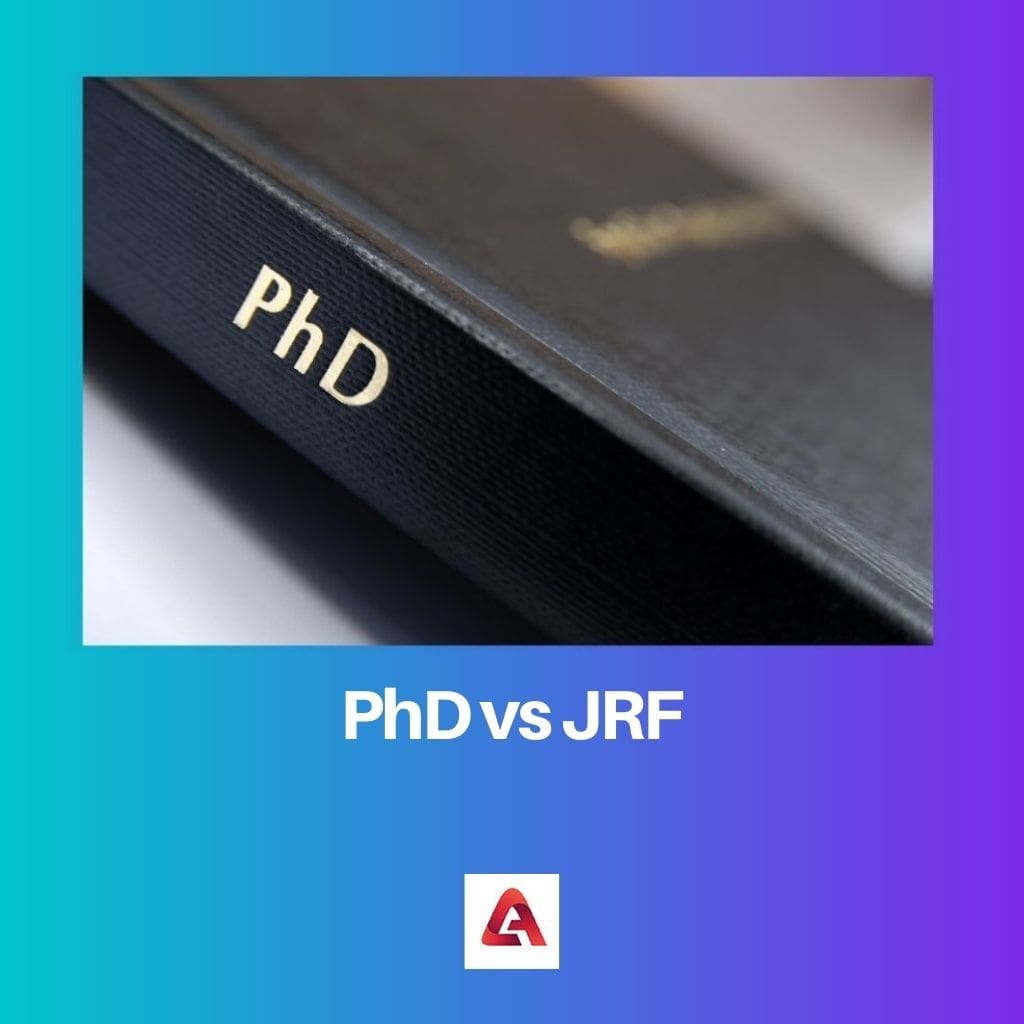Ph.D. and JRF are two separate terms related to a career in academics, significantly higher education.
Key Takeaways
- A Ph.D. (Doctor of Philosophy) is an advanced academic degree awarded to individuals who have completed original research in a specific field. At the same time, a JRF (Junior Research Fellowship) is a research position or grant awarded to postgraduate students to support their research work and the pursuit of a Ph.D.
- A Ph.D. requires the completion of a dissertation or thesis, which demonstrates the candidate’s ability to conduct independent research and contribute new knowledge to their field. At the same time, a JRF provides financial support and resources to help a researcher complete their Ph.D. studies.
- The primary goal of a Ph.D. program is to develop researchers capable of producing original, high-quality research. At the same time, a JRF serves as a means to support and encourage talented individuals in their pursuit of advanced research and academic careers.
Ph.D. vs. JRF
The difference between a Ph.D. and a JRF is that the former is a degree conferred on students on completion of their research thesis or dissertation. At the same time, the latter is a fellowship granted to students to encourage them to pursue advanced studies and research leading ultimately to M.Phil or PhD.

To get a Ph.D., one needs to produce original research work that would widen the knowledge base of a particular discipline and defend that work in the face of concerned field experts.
On the other hand, a Junior Research Fellowship or a JRF is a form of fellowship that is extended by the universities/colleges/institutions under the flagship JRF scheme of the University Grants Commission to the students who qualify for the National Eligibility Test and the Council of Scientific and Industrial Research (CSIR) joint test conducted by the National Testing Agency.
It also refers to a position conferred to a person researching a government-funded project.
Comparison Table
| Parameter of Comparison | PhD | JRF |
|---|---|---|
| Definition | It is the highest degree conferred on students for their original academic research work by a university or an institution of higher education. | It is a fellowship scheme extended to students by the UGC to encourage them to pursue advanced research and studies. |
| Eligibility | To pursue a PhD, one must have a Master’s or an M. Phil degree. | To avail of JRF, one must have qualified for the UGC-NET and UGC-CSIR joint exams. |
| Period | Minimum of three years and a maximum of five to six years. | Minimum of two years and a maximum of five years |
| Conferred by | A university or an institution of higher education. | University Grants Commission (UGC). |
| It is a requirement for | Employment as a professor or researcher, or scientist in a university. | We are undertaking advanced research and studies leading ultimately to M.Phil or PhD. |
What is PhD?
It is the highest degree conferred by a university on students who have completed their original research work in a particular discipline and, thus, contributed to expanding the knowledge base of the concerned field.
The degree is a symbol of approval received by the students for their research work submitted in the form of a thesis or a dissertation from the concerned field experts.
In many fields, a doctoral degree is considered a requirement for employment as a Professor, Researcher, or Scientist in a university or an institution.
After enrolling in a Ph.D. program, the candidates must submit their Research topic and Research proposal to the concerned university or institution, after which they would be allocated a Research Guide or Supervisor.
While working on their research project, the candidates must submit their six months of progress reports to the concerned university or institution.
Before the thesis submission, a pre-submission seminar would be organized by the candidate’s supervisor, based on which a report containing suggestions and modifications would be submitted.

What is JRF?
It is a fellowship scheme of the University Grants Commission provided by the universities/institutions/ colleges to the students who have qualified for the National Eligibility Test (NET) and the Council of Scientific and Industrial Research (CSIR) joint test.
After qualifying in the NET/CSIR joint exam, the candidates should enroll in an M.Phil/Ph.D. program within two years of receiving the qualifying certificate.
The goal of such a fellowship is to pursue the students to pursue advanced research and studies in their respective fields, ultimately leading to M.Phil and Ph.D.
The fellowship (25,000 per month + House Rent Allowance) is initially provided for two years. Following the end of these two years, the research work of the fellow is examined by a panel of experts.
After a year, the experts again evaluate the work of the fellow, who is provided with two more years of SRF if the panel is satisfied with the improvement of the fellow.
So, the total tenure of such a fellowship is five years (2 years JRF+3 years SRF).

Main Differences Between Ph.D. and JRF
- Both the terms are somehow related to advanced studies and research and, therefore, create confusion for a layperson. The main difference between a Ph.D. and a JRF is that the former is the highest degree conferred on students by their respective universities. At the same time, the latter is a fellowship scheme extended to the students by the UGC to help them pursue advanced research and studies.
- Students are required to qualify in the UGC-NET or UGC-CSIR joint exam to avail of the JRF scheme. At the same time, they must have a Master’s or M.Phil degree to enroll in a Ph.D. program.





